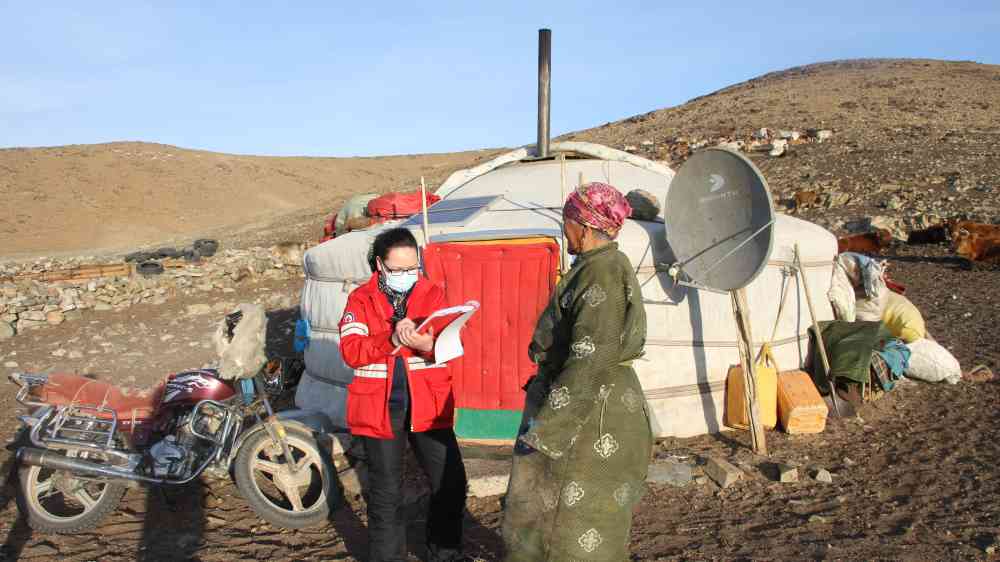Learning and improving: An evidence base for anticipatory action

Anticipatory action requires a shift in the humanitarian mindset. The Anticipation Hub is assembling the evidence.
Traditional humanitarian responses have an established, well-understood routine: a crisis unfolds, bringing on human suffering. Then humanitarian fundraisers jump into action equipped with tangible evidence of the obvious need in the form of images of people in despair.
The anticipatory approach instead asks for confidence in a less tangible form of evidence – a forecast of a potential crisis, sometime in the future.
“The system hasn’t been set up that way,” says the Anticipation Hub’s Arielle Tozier de la Poterie. “People are understandably afraid of acting in vain, allocating funds to things that might not take place.”
A hub for knowledge and learning about anticipatory action
The challenge is gathering and presenting empirical evidence about its effectiveness across hazards, actions, countries and organisations, and often from a small sample of beneficiaries.
The Anticipation Hub was set up in December 2020 with the goal of bringing together knowledge and expertise on anticipatory action. Hosted by the German Red Cross, the IFRC and the Climate Centre, the Hub has attracted partners from the Red Cross movement, private and public sector organisations, NGOs, academic institutes, and the UN system – including, recently, UNDRR.
In addition to its learning resources, communities of practice, and advocacy materials, the Anticipation Hub hosts three online databases, a single source of information and a space for practitioners to share experiences. These include: the Early Action Database, with details and guidance from more than 130 actions; the Evidence Database, hosting a growing number of evaluations of anticipatory activities; and the newest addition - the Trigger Database describing the data triggers that set off anticipatory actions.
At present these databases largely reflect the activities of the hosts and early partners, but they are expected to grow as the project gains momentum.
Empirical and anecdotal evidence
The Evidence Database reflects on those actions that have been activated and successfully evaluated. Typically, this involves measuring indicators against a control group who faced similar impacts from the same hazard, but where anticipatory actions weren’t in place. In many cases this is challenging, as those involved in implementation are often not equipped to carry out quasi-experimental studies.
Arielle views the Database’s role as documenting evidence and learning, and demonstrating the need for incorporating monitoring and evaluation into project design.
There is some evidence that anticipatory action can have benefits even when they aren’t activated, although this is harder to quantify. Arielle has conducted interviews with Red Cross National Societies involved in anticipatory action across the world.
“Within the Red Cross, early action protocols are often developed through partnerships between two or more National Societies. And so, as a result of the two or three – sometimes more – years of developing the documents and systems, there does seem to be quite bit of National Society capacity building that takes place in terms of refining systems, contingency plans, and operations.”
These are likely to have benefits for affected populations.
A shift at the national level
An anecdotal example she provides is the response to Cyclone Ana, in Mozambique in January 2022. While the cyclone Early Action Protocol could not be activated for that event, as it had not yet been revalidated, the Mozambican Red Cross (CVM - Cruz Vermelha de Moçambique) were able to access advance emergency funding from the IFRC’s Disaster Relief Emergency Fund (DREF).
“That in itself is a victory and demonstrates the shift that's taken place within that National Society,” Arielle says. “Before the CVM had done all this work on anticipation, I don't even think that the possibility of getting advance funds would have been on their radar.”
“Now they know how to navigate the system, and have a better sense of what is needed before an event, so they can be much more proactive, rather than waiting to see the outcome of the event, and then try to see how they can respond.”
If the Anticipation Hub makes good on its promise, it will contribute to a shift both in the mindset of humanitarian strategists and funders as they develop programmes, and for local actors taking greater control of planning and implementation – including building in robust monitoring and evaluation. That, in turn, should generate more empirical evidence to strengthen the anticipatory approach.
Arielle Tozier de la Poterie is a specialist in applied research for disaster risk reduction, climate change adaptation, and anticipatory humanitarian action. Her work for the German Red Cross and the Anticipation Hub focuses on learning from and improving anticipatory humanitarian programs; this includes establishing and managing the Hub's Early Action Database and Evidence Database.
Martin Field is a content producer for UNDRR / PreventionWeb.
Editors' recommendations
- Early action gets a boost with launch of new Anticipation Hub
- Seven reasons to act early, before a hazard turns into a disaster
- Markus Enenkel: If disasters can be predicted, acting early is the right thing to do
- The trigger database is live!
- Dealing with a crisis within a crisis: Anticipatory Action in the age of Covid-19